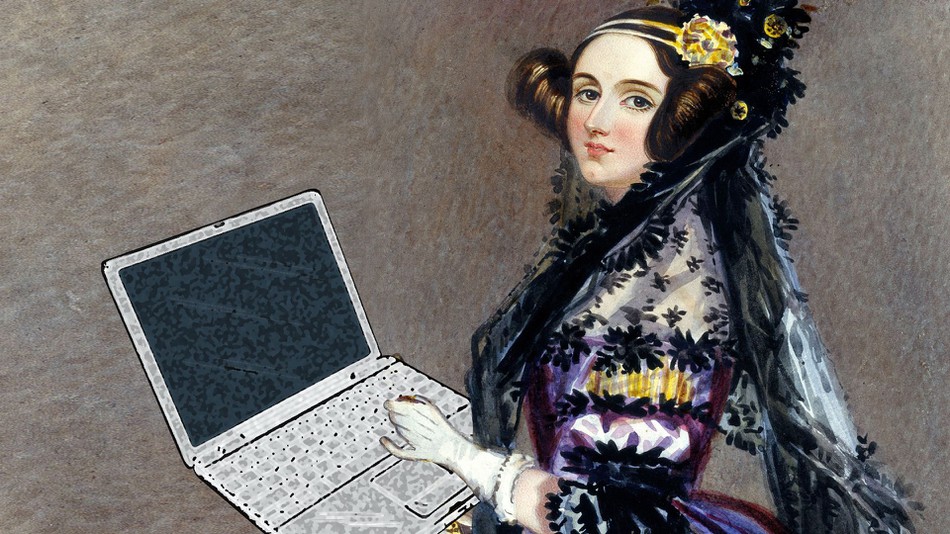We cannot live in a world that is not our own, in a world that is interpreted for us by others. An interpreted world is not a home. – Hildegard of Bingen
[Women Part 7 of 9: 1) Introduction, 2) Bodies, 3) Health, 4) Work, 5) Superwomen, 6) Religion, 7) In Tech, 8) Online 9) Conclusions]
A couple of years ago, one of the dads at my girls’ school, following an initiative at his workplace, wanted help setting up an after school coding club to teach kids to program. He asked me if I would come along and help because there was a bit about Ada Lovelace and the guidelines would preferably have a woman giving that presentation. I said I would be pleased to be a role model to guide young girls into IT. I said I would bring my girls and yep, sign me up, show me the materials.
One of my girls at the time was one year too young for the club (following his guidelines) but I said that it would be fine, she’s smart with a love of mathematics, she should come, Indeed she had to come as I look after her, but this man was insistent that she couldn’t come. He didn’t want me childminding – not that I would have been, I would have been teaching – and doing a job. His own wife who had worked in IT stayed at home and looked after his children whilst he ran the code club.
So there you have it. If there hadn’t been a mention in his materials about needing a woman to talk about their job in IT, I doubt he would have even asked me, male group think is prevalent in IT, as well as lots of parts of society. He certainly never felt the need to explain his reasons for not updating me on his plans, and he ran the club regardless with other dads and never mentioned it to me again nor did he ever show me any of the materials. The worst bit of all in this troubling tale is that this man is an IT manager. A manager!!!
This anecdote, for me, sums up many experiences I have had in the world of IT: A socially awkward male cannot imagine what it is like to be a woman nor can he bend a tiny rule for something bigger than himself.
I am so used to this sort of nonsense in society, I just let it slide. His individual lack of initiative and imagination can be found everywhere. There are a million stories of women being treated as unimportant in the computing industry and other domains as I discussed in the blog on Women’s Work and that is before we mention the purposeful aggression and sexism and appalling behaviour which happens towards women too.
The picture above is a mashup of Ada Byron, Countess of Lovelace, who worked with Charles Babbage on his computing machine so officially she is the first computer programmer. A lot of computing pioneers were women. According to National Program Radio, who looked at the statistics for women in computing, the number of women studying computer science grew faster than the number of men until 1984, when the home computer was invented and marketed to boys, inventing the nerd stereotype and overwriting all the true stories of women in IT.
I was a final year undergraduate the first time I heard about Ada Lovelace and the only reason I learnt about her was because the programming language ADA is named after her. Sitting in a lecture hall full of men, the story of a woman was so invigorating, I taught myself ADA and wrote my final year project in ADA. It only took a few facts of her life to make me feel excited, included, inspired. What other things might I have decided to do had I known about NASA programmer Margaret Hamilton whose code put men on the moon, she brought her daughter with her to the lab too, and Grace Hopper and her machine independent language ideas which led to COBOL? I learnt COBOL in my second year but no one ever thought she was worth a mention. I tell you COBOL and I might have gotten along much better had I known about Grace.
Female computer scientists were not mentioned during my many years of formal education. Rather like the early 19th century women scientists Caroline Herschel, Jane Marcet, and Mary Somerville, who in their lifetimes were recognised as being at the forefront of European science, but were no longer spoken about by the end of the 19th century because all women had been barred from graduating from university. Written out of history, and not given the legitimacy of belonging like men. What message does that send a woman?
Our culture sends messages whether we like or not and mass culture likes to give us what we already like because it is based on economics. So the moment the male computing geek stereotype was invented, that narrative excluded women, it overwrote those great female stories. Like sells like, and fiscal reasoning doesn’t care about telling new stories especially when it comes to women. Progress is a myth where technology is concerned. We think that any progress is an advancement but it is not. Semiotically speaking, we look for a how not a what, and we choose and reject stories based on how true they feel, which is based on familiarity i.e. the stories we know. So, if a constant narrative is that girls don’t do computing and boys do then this must be true.
It encourages a cultural devaluation of women across society and in particular in technology. Take Stuff Magazine, a magazine for men who are interested in technology. It made me so cross objectifying women that I had to write a whole blog slagging it off and I only slag things off when I am angry. A Menkind shop has just opened up near me which is a gadget shop. Why is it called Menkind? When I passed it, it had a Harry Potter cutout in the window. Harry Potter eh? We all know that J K Rowling chose her pen name so that she would appeal to young boys. Heaven forbid that society encourages little boys to take women seriously and to listen to whatever story they might have to tell. The bottom line is like sells like, and the bottom line is hard cold cash. Progress is a myth and women’s stories are unimportant.
New Scientist news editor @PennySarchet wrote in a tweet how she was advised during her PhD to explain everything really simply as if you were talking to a child or your mother. The original tweet she quotes and which has been deleted says grandmother. The cultural devaluation of women starts at home with the mother.
And yet there is hope. There is always hope. Recently, I read Goodnight Stories for Rebel Girls by Elena Favilli and Francesca Cavallo which in the link there to the Guardian has the female reviewer saying her daughter was disappointed not to find J K Rowling and the reviewer herself was disappointed to find Margaret Thatcher. J K Rowling writes books, yes successfully, whereas Thatcher was the first UK female Prime Minister, so the book has made the right choice. You can’t edit Thatcher out of history just because you don’t want to hear her story. She is, historically speaking, an incredibly important figure. Rowling, we can’t say yet, time will tell. But we can say this, she wasn’t the first woman writer in UK history. She is just one that the female reviewer’s daughter has heard of because she hasn’t heard many women’s stories. Why? Because many women have been written out of history. Am I repeating myself?
I read the book with my daughter who was really interested in the coders and physicists because of me. She kept showing me them and having a chat about it because she is looking for stories which make sense about her world, (even though she was excluded from code club, miaow), a world in which luckily for her, her mother loves computing, and takes up space in that field. But what about those girls whose mothers don’t and only the dads do computing in after school code club?
Lillian Robinson says in Wonder Women: Feminism in stories is about the politics of stories. Each time a story about a woman doing something in a domain that society has traditionally defined as a man’s world is told, that narrative becomes part of the information we women and our girls coming after us use to process our experiences, which leads to that man’s world becoming less male and more populated by women. Hopefully an equal world of equal opportunity. And, the opposite is true, if all the sources of narrative tell the same story about women then nothing will ever change. Like sells like remember.
Let us know as truth that the narratives behind the field of computer science need to be rewritten, let’s stop dealing in stereotypes and lazy journalism, and the misogyny of female prime ministers (which is a whole other blog in itself). Let us look at the big picture, the bright one which stops telling us only men do IT. In Living a Feminist Life, Sara Ahmed says:
Feminism helps you to make sense that something is wrong; to recognise a wrong is to realise that you are not in the wrong.
Don’t make our girls wrong about computing.
[8) Online]







5 comments